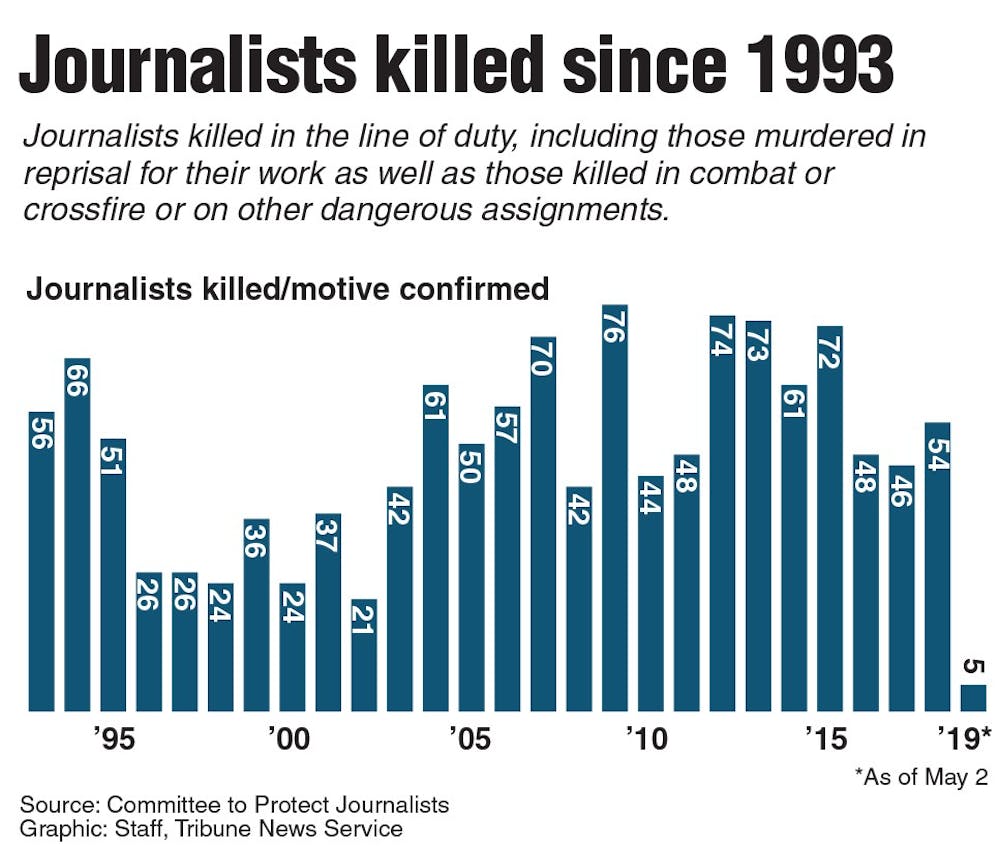
Demi Lawrence is a junior journalism news major and writes "Unspoken" for The Daily News. Her views do not necessarily agree with those of the newspaper. Write to Demi at dnlawrence@bsu.edu.
For my Spanish final during the 2018 fall semester, I had to have a 30-minute-long conversation completely in Spanish with my professor. I was nervous – barely passing the class – but I knew I could lead the conversation however I wanted to. I decided to talk about the one thing I knew best: journalism.
At the end of those 30 minutes, I stood up, relieved to be done with Spanish for the rest of my college career. My professor stood up too, stopped speaking Spanish and spoke softly in English.
“I used to live in Venezuela, I came here when it got bad. The free media is the first to go when countries get bad. Thank you for what you do,” he said.
Today, we celebrate arguably one of the most vital assets to a free nation: a free press.
The Declaration of Windhoek, a declaration produced at the United Nations Educational, Scientific and Cultural Organization (UNESCO) General Conference in Windhoek, Namibia, was created in 1991 by African journalists, setting precedents throughout the world for the protection of the press and its freedoms. Because of this declaration, May 3 was named World Press Freedom Day in 1993.
“Fake news.” Every time I hear this term, it shatters my soul.
This term has been publicized and made a household phrase by President Donald Trump since his candidacy in 2016. Nearly every time I introduce myself as a journalist to someone who doesn’t know me, I am greeted with those infamous and insulting words.
Just because you do not agree with it does not mean it is fake. “Fake news” implies that everything the reader reads has some level of falsity to it. While curiosity and skepticism are important — two major things I have been taught in my college journalism classes — a complete and utter denial of facts simply because they do not align with one’s beliefs or ideas of what is “true” is incredibly dangerous.
A fact is a fact. It is a fact that the Earth revolves around the Sun, and simple opinions cannot disprove hard facts. Just because one does not believe the Earth revolves around the Sun does not mean that it’s all of a sudden not. One’s idea of a “fact” isn’t always that. Sometimes its a blind and ignorant opinion.
We cannot have access to these real truths without a free press. Without a completely free press, these blind and ignorant opinions will blur themselves into a mutant version of a fact.
A free press frees minds; A state-run or unfree press does not. We are all too familiar with the eerie, horrifying and downright creepy realities of North Korea’s completely state-run media. I wouldn’t even consider them to have “press.” It’s propaganda.
While this is a very severe version of a heavily-censored press, it starts with the little things. It can possibly start with former Governor Mike Pence wanting to launch a website titled JustIN, which was essentially a state-run news service. After national uproar, Pence and his administration killed it, but the fact that this was even a consideration in the “land of the free” shakes me to my bones.
According to the 2019 World Press Freedom index, Norway, Finland and Sweden lead the world with the most free press due to their transparency and protection of journalists and free press legislation.
The United States, out of 180 countries, rests at 48th place, three places down from 2018. According to the index, this is due to President Trump’s repeated verbal attacks on the press, attempts to deny some news outlets access to the White House and several cases where journalists have been arrested or physically assaulted for trying to do their job.
Countries filled in black are the worst countries for press freedom on the index. Apart from North Korea, 19 countries are adorned in black, including China, Iran and Cuba. All of these countries have either highly-censored media, completely state-run media or unfair treatment of journalists.
Every human deserves to know the real truth, not the “truth” their government chooses to either tell them or hide from them.
Keep press free. Ignorance is not bliss, but rather it is the opposite. Knowledge is the ultimate key to the mind, and we cannot have knowledge without unbarred facts.





